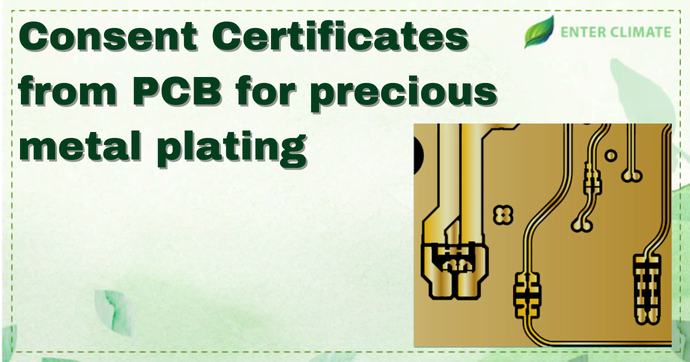How to get Pollution board consent for hospitals and healthcare establishments?
 02 Dec, 2022
02 Dec, 2022 
As per the Air Act, the Water Act and Hazardous Waste Management Rules, 2016, a Consent Certificate, also known as a Pollution No Objection Certificate (NOC), is required by all public or private Healthcare establishments like clinics, healthcare facilities, hospitals, and medical laboratories. As per the CPCB category list of industries, a hospital or healthcare facility (HCF)is mainly water-polluting. While the solid waste, hazardous waste and biomedical waste generated by these units are segregated at the source, the wastewater needs to be treated before it reaches the municipal sewage. Therefore these establishment needs NOC from the concerned SPCB/PCC. Consent for hospitals and healthcare establishments requires the installation of ETP in the premises along with other pollution control equipment as per the provisions of the Air Act and Water Act. The biomedical waste (BMW) generated during the treatment of the patients and research work is separated and either treated by the establishment or sent to Common Biomedical Waste treatment facilities (CBMWTF). For the disposal of BMW, an authorisation is also required by the SPCB/PCC, that is known as Bio-medical Waste (BMW) Authorization. Generally, these two certificates are issued together when the HCF or a hospital is established. Continue reading until the end to find out the registration and authorisation requirements for Pollution board consent for hospitals and healthcare establishments.
Criteria for Pollution Board Consent for hospitals and healthcare establishments
The Central Pollution Control Board has mandated the below-mentioned criteria for the disposal of waste wastewater on the basis of two factors- the quantity of wastewater generated and the presence of an incineration facility on the premises.
- The water pollution score for Health care facilities (HCF)is normalised to about 100 and is applicable to those hospitals having total wastewater generation of more than 100 kilolitres per day (KLD).
- Hospitals with incinerators for BMW disposal are categorised under the red category, irrespective of the quantity of wastewater generation.
- Hospitals having a total wastewater generation of less than 100 KLD and without incinerators have a normalised water pollution score of 50 and will be categorised in the Orange category.
Consent NOC Application Process
As with any other industrial establishment, the application process of Pollution Board Consent for hospitals and healthcare establishments follows three stages, i.e. application, document scrutiny and issuance of pollution NOC. The consent certificate is issued in two parts, i.e. first before the construction of the facility begins, for which consent to Establish (CTE) is given, and the second is given when the project is complete and ready to function. This is known as Consent to Operate (CTO). The steps involved in the consent application are
| Application and fee Submission For obtaining consent for hospitals and healthcare establishments, the facility must apply for consent to their concerned SPCB/PCC through the Online Consent Management and Monitoring System (OCMMS) of the State Pollution Control Board. | Document Scrutiny and Site Inspection, The regional officer, scrutinises the document and informs the applicant of any shortcomings in the application for consent for hospitals and healthcare establishments. A site inspection is scheduled after the facility has been set up, during which the declaration by the applicant w.r.t pollution control measures will be inspected. | Issue of Pollution NOC If the inspection report prepared by the site inspector is satisfactory, the facility will be issued the Pollution board consent for hospitals and healthcare establishments in a time-bound manner by the Chairman or the Member Secretary. |
Documents Required for consent for hospitals and healthcare establishments
For Consent to Establish
- Duly filled Applications form concerned SPCB.
- Undertaking in prescribed format
- Site Plan or layout plan with a roadmap
- Detailed Project Report
- point sources of effluent discharge /solid waste / hazardous waste and air emission.
- Details of the capital cost of the facility, source of water, and its required quantity, water balance etc.
- Land documents such as a copy of rent or lease proof
- Industry Registration.
- Consent fee
- Any other Document mentioned in the Application Form
For Consent to Operate (CTO)
- Duly filled Application form
- Balanced Sheet by CA
- Copy of CTE
- Details of water /air pollution control instruments and solid waste/plastic waste/ hazardous waste management
- Laboratory analysis report of the ETP
- Copy of any environmental clearance
- Any other permission required by the State Government.
- Any other Document asked in the CTO application form
Inspection Procedure
Pre-Inspection: A scrutiny of the documents submitted by the applicant is conducted. Parameters such as correctness and completeness of the information furnished are scrutinised w.r.t the type of industry. Here the environmental engineer can raise and assign the file to the concerned inspecting officer.
The inspector will obtain information about the location of the industry, like the location of the facility, past consents, previous inspection reports and notices issued to the industry for non-compliance and the track record of the industry.
By collecting background information and the previous compliance history of the applicant. This will enable the officer to get familiar with the nature of operations of the facility and note specific areas that will require more detailed investigation during the inspection process.
Inspection: The inspecting officer will inform the occupier or his representative of the purpose of the proposed inspection. The inspecting officer will make the inspection report on the following factors.
- Details about the location and boundaries of the site.
- Effluent generation and control systems
- Collection, treatment and disposal areas for effluent.
- Air pollution sources and control systems were installed.
- Sources of solid/ hazardous wastes generation, their storage and disposal methods
- Operation and maintenance records of effluent treatment plant (ETP)
- Operation as well as maintenance records of pollution control equipment for controlling air and noise pollution
Biomedical Waste Generation and segregation Authorisation
Besides the Consent Certificate, the healthcare facilities must also apply for BMW Authorisation(for the generation of biomedical waste) to the SPCB/PCC. Consent is required for the segregation, collection, transportation and disposal of such biomedical waste. Every State Pollution Control Board in a State or the Pollution Control Committee issues Pollution board consent for hospitals and healthcare establishments. Generation and segregation of biomedical waste are the two stages for which the Biomedical waste generators (hospitals and HCFs) have been made responsible.
Step by Step Process to get Pollution board consent for hospitals and healthcare establishments
| Application, documents and fee Submission The user has to register on the Online Consent Management and Monitoring System Portal of the concerned SPCB or log into the system (if already registered) and apply for BMW authorisation under the category of HCF it falls (depending on the no. of hospital beds). | Scrutiny for Application The application is then forwarded to the area’s concerned Assistant Environmental Engineer (AEE) for scrutiny. If the application is complete, the AEE forwards the application to Environmental Engineer for further orders. | Site Inspection The Environmental Engineer may raise an inspection order to AEE for visiting the hospitals and healthcare establishments. As per the information provided, the environmental engineer will ask Assistant Environmental Engineer to generate the BMW authorisation certificate. |
Documents Required by Bio-medical Waste Generator (HCFs, private clinics, hospitals, nursing homes etc. for BMW Authorization.
- Copy of Aadhar Card
- Copy of Pan card
- Duly Filled Form- II includes the quantity of waste generated in the four categories of biomedical waste
- Self-declaration in case the HCF does not generate Bio-medical waste.
- Copy of Registration of the State’s Medical Council Board (of the occupier)
- Agreement copy with a CBMWTF or Common Bio-Medical Waste Treatment Facility Operator[1].
- In case of renewal –a copy of the previous authorisation
- Noise Monitoring Report (if applicable)
- Undertaking in prescribed format attested by the applicant.
Conclusion
To streamline the processing and disposal of the Consent NOC, the applications received for Consent NOC under the Air Act 1981 and Water Act 1974 are processed along with the BMW authorisation. Various State Pollution Control Boards have been framing policies and issuing necessary orders under the supervision of the Central Pollution Control Board to the state government and the medical councils to effectively manage waste generated in such facilities due to the contaminating nature of the waste produced by Hospitals and healthcare facilities.
Read our Article: General overview of the Polluter Pays Principle
Categories
Latest Post
Air pollution Dispersion Modeling
Natural Disaster Risk Assessment
Endangered Species Protection
Aquifer Recharge Project
Sustainable Sanitation Solutions














